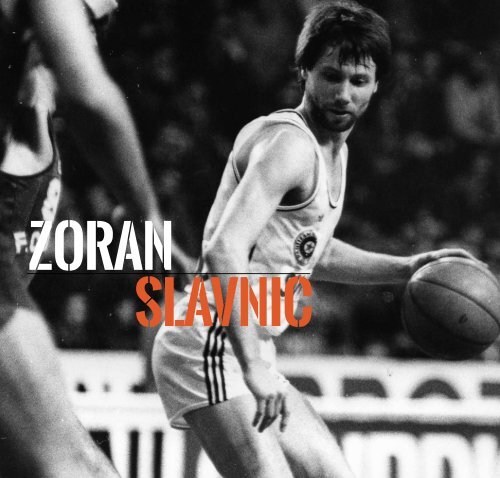Create successful ePaper yourself
Turn your PDF publications into a flip-book with our unique Google optimized e-Paper software.
Zoran<br />
Slavnic<br />
335
The first showman<br />
To the long list <strong>of</strong> great players from the<br />
past who never won the top <strong>European</strong><br />
title – among them Kresimir Cosic, Oscar<br />
Schmidt, Dragan Kicanovic, Nikos Galis,<br />
Drazen Dalipagic, Ivo Daneu and Juan Antonio<br />
San Epifanio – I add one more: Zoran<br />
“Moka” Slavnic. Without a doubt, he belongs to that<br />
list <strong>of</strong> stars from the past.<br />
He made up for the lack <strong>of</strong> trophies at the club level<br />
with great triumphs playing for the Yugoslav national<br />
team. Slavnic won eight major honors with the national<br />
team. He was an Olympic champion in Moscow in 1980<br />
and silver medalist in Montreal 1976. He was also a<br />
world champ in 1978 in Manila and runner-up in that<br />
competition in 1974 in San Juan. Slavnic also tasted<br />
EuroBasket glory in 1973 in Barcelona, 1975 in Belgrade<br />
and 1977 in Liege, in addition to a bronze medal in<br />
1979 in Turin. In total, he earned eight medals in major<br />
competitions over 10 years from his debut at the 1973<br />
EuroBasket until his retirement after the 1983 edition<br />
<strong>of</strong> the same tournament.<br />
It might have been more, but Slavnic, who was born<br />
on October 26, 1949, in Belgrade, did not make his debut<br />
with the national team at a major competition until<br />
he was 24 years old! It was Mirko Novosel who gave the<br />
Crvena Zvezda guard a shot after the previous boss,<br />
Ranko Zeravica, overlooked Slavnic. Zeravica considered<br />
Slavnic “an undisciplined player.” What Zeravica<br />
thought was wrong about Moka – who got his nickname<br />
from childhood friends due to his love <strong>of</strong> mocha-flavored<br />
cakes – was what Novosel thought to be his most<br />
brilliant feature: creativity.<br />
Slavnic was not your usual player. His imagination<br />
was above any tactics or orders from a coach. He was,<br />
simply put, the Improv King. He was guided by his gut,<br />
always with the idea that basketball is just a game and<br />
you had to have fun. Sometimes he had too much fun,<br />
but he also gave fans a lot <strong>of</strong> joy. He was willing to do<br />
anything to make people laugh, applaud or admire him.<br />
He even caused hatred from opponents, who were ridiculed<br />
by some <strong>of</strong> his plays; passes between the legs <strong>of</strong><br />
the rival, assists behind the back or some other invention<br />
<strong>of</strong> his. At just 1.81 meters, Slavnic was not able to<br />
dunk, but once on a fastbreak, he tried to do it anyway<br />
– with a teammate who lifted him up! I would say that<br />
Moka Slavnic was the first showman in <strong>European</strong> basketball.<br />
Better late than never<br />
As a junior player, Slavnic showed talent in many<br />
sports, from handball to swimming to athletics and<br />
basketball. His first coach in Crvena Zvezda, Zdravko<br />
Kubat, soon saw the talent in him and paired him on a<br />
team with Dragan Kapicic. Slavnic made his debut with<br />
the Yugoslav junior national team in 1967 at the qualifying<br />
tournament for the 1968 FIBA <strong>European</strong> Championship<br />
for Junior Men in Vigo, Spain, where Yugoslavia<br />
finished second after losing to the USSR in the final,<br />
82-73. Along with Slavnic, there were players like Vinko<br />
Jelovac, Ljubodrag Simonovic, Damir Solman, Dragisa<br />
Vucinic, Mihajlo Manovic and Ivan Sarjanovic. Only two<br />
years later, at the 1970 World Cup in Ljubljana, Slovenia,<br />
several <strong>of</strong> them – Jelovac, Simonovic, Solman and Kapicic<br />
– were world champs at 22 years old, while Slavnic<br />
could only watch the games on TV.<br />
<strong>101</strong> greats <strong>of</strong> european basketball<br />
Zoran Slavnic<br />
S
Vladimir Stankovic<br />
Slavnic made his <strong>of</strong>ficial debut with the Yugoslav<br />
first team in 1970 in some exhibition games, but Zeravica<br />
didn’t trust him and he didn’t play in the 1971 Euro-<br />
Basket or the 1972 Olympics in Munich. With his special<br />
sense <strong>of</strong> humor, Slavnic accepted the situation, saying<br />
<strong>of</strong> Zeravica, “Even the best are also wrong sometimes.”<br />
He added with irony that Zeravica “made my career longer<br />
because I started to damage myself later.”<br />
At the 1973 EuroBasket in Barcelona, where Yugoslavia<br />
won its first medal, Slavnic finished the tournament<br />
with 8.1 points per game. He made the national<br />
team and did not leave it until he retired in 1983 after<br />
EuroBasket in Nantes. His career average was 8.3<br />
points per game, with his highest being 12.5 points at<br />
the 1976 Olympics in Montreal. It was there that Slavnic<br />
scored one <strong>of</strong> the most important baskets <strong>of</strong> his career.<br />
In the game against Italy to decide the second semifinalist,<br />
the Italians were ahead at the break, 57-41. It<br />
looked like a desperate situation, but little by little the<br />
Yugoslavs trimmed the deficit. On the game’s last possession,<br />
with the ball in their hands, the Blues were only<br />
one point down. After good ball circulation, Slavnic was<br />
left open, and from about 7 meters out, he scored at<br />
the buzzer the basket that would take Yugoslavia to the<br />
semis and later to the final.<br />
During those 10 years, Slavnic was the starting<br />
point guard <strong>of</strong> a great Yugoslav team. In the end, he<br />
played 179 games (150 wins, 29 losses) and scored<br />
1,465 points. Scoring was not his thing, but he is still<br />
one <strong>of</strong> the best scorers in the history <strong>of</strong> the national<br />
team. The ball in his hands was like it had been inside<br />
a safe. He turned over very few balls and he had many<br />
more steals. He was good at shooting and especially<br />
had great court vision for unbelievable assists. Usually,<br />
the starting five on the team was Slavnic, Kicanovic,<br />
Dalipagic, Jelovac (or Zeljko Jerkov) and Cosic. Even<br />
though he had the ball in his hands most <strong>of</strong> the time,<br />
Slavnic himself acknowledged that Kreso Cosic was the<br />
leader <strong>of</strong> that team. For Slavnic, and many others, Cosic<br />
was the best Yugoslav player ever.<br />
If Cosic was the basketball leader, Slavnic surely was<br />
the main attraction. He was also willing to joke or find<br />
a way to motivate his teammates. At the 1978 World<br />
Cup in Manila, in a crucial moment during a tough game<br />
against Brazil, the team was in a timeout just before<br />
Mirza Delibasic was to take free throws. Slavnic <strong>of</strong>fered<br />
a bet to Mirza: “I bet you 100 dollars that you do not<br />
score both attempts.”<br />
Delibasic took the bet and calmly scored both free<br />
throws, which was what Moka wanted.<br />
With Crvena Zvezda, Slavnic won two Yugoslav<br />
League titles, in 1962 and 1972. He played twice in<br />
the EuroLeague, but without remarkable results. He<br />
would not be empty-handed at the club level, however.<br />
After losing the 1972 Saporta Cup final in Thessaloniki<br />
against Simmenthal Milano 74-70, despite Slavnic’s 12<br />
points, Crvena Zvezda won the same competition in<br />
1974 in Udine, Italy. The team beat Spartak Brno 86-<br />
75 with 20 points by Slavnic, 19 by Simonovic and 23<br />
by Kapicic. The following year, in the final <strong>of</strong> the same<br />
competition in Nantes, Zvezda lost to Spartak Saint<br />
Petersburg, led by Aleksandar Belov, 63-62. Slavnic<br />
scored 21 points, but Simonovic (5) and Kapicic (3)<br />
were not at their expected level. Slavnic made his debut<br />
in the Crvena Zvezda first team in 1968-69 under coach<br />
Milan Bjegojevic and stayed through 1977, playing 222<br />
games and scoring 2,829 points (12.7 ppg.) for the club.<br />
Champion with Joventut<br />
After the 1977 EuroBasket in Belgium, Slavnic<br />
336<br />
337
moved to Spain and signed with Joventut Badalona.<br />
There, he found competitive teammates – Josep Maria<br />
Margall, Luis Miguel Santillana, Joan Filba and Manuel<br />
Bosch – who just needed a floor general. Slavnic’s pr<strong>of</strong>ile<br />
fit perfectly and the team won the Spanish League in<br />
1977-78. He stayed one more season in Badalona and<br />
after that he joined Sibenka, where he was player-coach<br />
and allowed a 15-year old Drazen Petrovic to play his<br />
first minutes. Despite being known for having said “I<br />
hate Partizan more than I love Crvena Zvezda,” Slavnic<br />
played for Partizan in the 1981-82 season. Slavnic finished<br />
his career with Juventus Caserta in Italy with fair<br />
numbers: 17.2 points, 3.4 rebounds and 3.3 assists in<br />
37 minutes per game.<br />
After a brilliant playing career, Slavnic turned to<br />
coaching, but he was far less successful. He had a good<br />
eye for young talent, however, and encouraged the debut<br />
<strong>of</strong> many young players. He started in Sibenka with<br />
Petrovic and then did the same in Jugoplastika with<br />
players like Toni Kukoc and Dino Radja. The same thing<br />
happened for Partizan, with Sasha Djordjevic and Dragan<br />
Tarlac, as well as for Crvena Zvezda, with Sasa Obradovic.<br />
Slavnic worked in Spain and Germany and for<br />
the 2007 EuroBasket <strong>of</strong> Spain, where he achieved his<br />
dream <strong>of</strong> coaching the Yugoslav national team. However,<br />
Slavnic’s place in history is as a player – a great one.<br />
Zoran Slavnic<br />
<strong>101</strong> greats <strong>of</strong> european basketball<br />
S

















